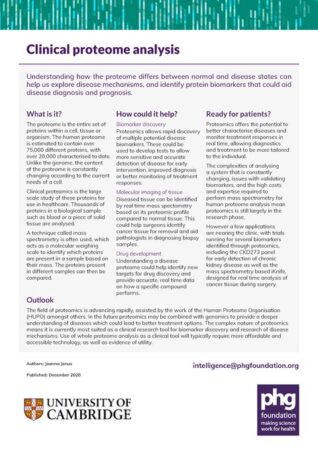What is it?
The proteome is the entire set of proteins within a cell, tissue or organism. The human proteome is estimated to contain over 75,000 different proteins, with over 20,000 characterised to date. Unlike the genome, the content of the proteome is constantly changing according to the current needs of a cell.
Clinical proteomics is the large scale study of these proteins for use in healthcare. Thousands of proteins in a biological sample such as blood or a piece of solid tissue are analysed.
A technique called mass spectrometry is often used, which acts as a molecular weighing scale to identify which proteins are present in a sample based on their mass. The proteins present in different samples can then be compared.
How could it help?
Biomarker discovery – Proteomics allows rapid discovery of multiple potential disease biomarkers. These could be used to develop tests to allow more sensitive and accurate detection of disease for early intervention, improved diagnosis or better monitoring of treatment responses.
Molecular imaging of tissue – Diseased tissue can be identified by real time mass spectometry based on its proteomic profile compared to normal tissue. This could help surgeons identify cancer tissue for removal and aid pathologists in diagnosing biopsy samples.
Drug development – Understanding a disease proteome could help identify new targets for drug discovery and provide accurate, real time data on how a specific compound performs.
Ready for patients?
Proteomics offers the potential to better characterise diseases and monitor treatment responses in real time, allowing diagnostics and treatment to be more tailored to the individual. The complexities of analysing a system that is constantly changing, issues with validating biomarkers, and the high costs and expertise required to perform mass spectrometry for human proteome analysis mean proteomics is still largely in the research phase. However a few applications are nearing the clinic, with trials running for several biomarkers identified through proteomics, including the CKD273 panel for early detection of chronic kidney disease as well as the mass spectrometry based iKnife, designed for real time analysis of cancer tissue during surgery.
Outlook
The field of proteomics is advancing rapidly, assisted by the work of the Human Proteome Organisation (HUPO) amongst others. In the future proteomics may be combined with genomics to provide a deeper understanding of diseases which could lead to better treatment options. The complex nature of proteomics means it is currently most suited as a clinical research tool for biomarker discovery and research of disease mechanisms. Use of whole proteome analysis as a clinical tool will typically require more affordable and accessible technology, as well as evidence of utility.

